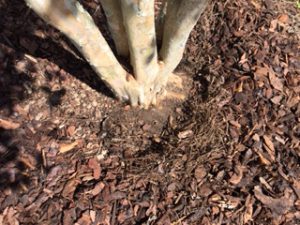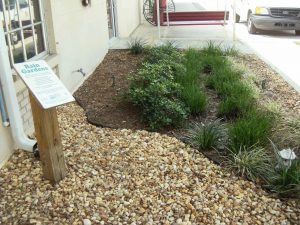Social distancing has become an all-too important description of our healthy relationships with one another during the pandemic. Did you know plants can benefit from “distancing” too? In fact, for central Florida gardeners, “distancing” in our landscapes has always been part of a recipe for growing healthy plants!
Following are three ways that “plant distancing” can help you in your own landscape:
DISTANCING PLANTS FROM OTHER PLANTS: Plants installed too close together often prohibit adequate air circulation between them. The importance of ample “distancing” of plants is especially evident in the summer. Our typical summer heat and high humidity create conditions which stress our plants, making them more susceptible to diseases and pest insects. When choosing a plant, make sure you have an idea of its expected size at maturity. Then, place it in your garden or landscape with room to grow without crowding nearby plants.

DISTANCING PLANTS FROM MULCH: Organic mulch in a landscape has many benefits; however, too much can lead to problems with plant health. When applying mulch to landscape beds, there are two main goals; one being to maintain a mulch depth of about 2-3 inches, and the other is to avoid piling any mulch against the trunk of a tree or center of a plant.
Often, there is the thought that if mulch is good, then continuing to add new mulch season after season must be even better. Too much mulch leads to increased risk of plant diseases and pests.
The best practice for maintaining organic mulch in landscape beds is to “assess” mulch seasonally. If compacted, rake up old mulch and add new, if needed to achieve 2-3” depth. If old mulch has piled up against the center of plant or tree trunk, rake it away.
Piling mulch against tree trunks is referred to as “volcano mulching”, a detrimental practice that is too often regrettably seen in public tree beds. Volcano mulching can eventually lead to the death of a tree.

DISTANCING PLANTS FROM BUILDINGS: When installing plants adjacent to building foundations, make sure you leave enough space to allow the plant to grow without the need to continually prune it away from the walls. The important thing is to know the plant’s growth habit. Installing foundation plants that have large expected sizes at maturity require frequent pruning in order to create space between plant and wall. Ideally, foundation plants are best chosen for their diminutive nature; plants that are not expected to achieve a height more than three or four feet. Trees, palms and shrubs that are expected to be larger in size can be planted farther away from the building.

These benefits of “plant distancing” are addressed in two of the nine Florida-Friendly Landscaping™ Principles – Right Plant, Right Place and Mulch. Proper placement of plants saves money, time and extra maintenance.
Let’s all stay safe by social distancing and keep our plants healthy by “distancing” too! Happy Gardening!
This article was written by Master Gardener Volunteer Molly Griner under supervision of the Master Gardener Volunteer Coordinator and Residential Horticulture Agent Anne Yasalonis.
For more information, contact UF/IFAS Extension Polk County at (863) 519-1041 or visit us online at http://sfyl.ifas.ufl.edu/polk. The Plant Clinic is open Monday-Friday, 9:00 am-4:00 pm to answer your gardening and landscaping questions. Give us a call, or email us at polkmg@ifas.ufl.edu.
If you are not in Polk County, Contact your local UF/IFAS Extension Master Gardener Volunteer Plant Clinic.
The Florida Master Gardener Volunteer Program is a volunteer-driven program that benefits UF/IFAS Extension and the citizens of Florida. The program extends the vision of the University of Florida/Institute of Food and Agricultural Sciences, all the while protecting and sustaining natural resources and environmental systems, enhancing the development of human resources, and improving the quality of human life through the development of knowledge in agricultural, human and natural resources and making that knowledge accessible.
An Equal Opportunity Institution.
 0
0
